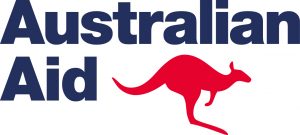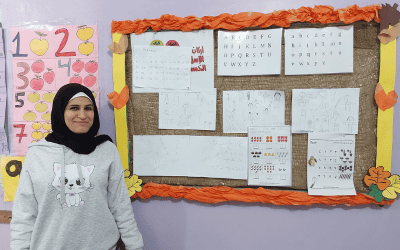Since 2019, the financial political and social situation in Lebanon has been disastrous for all working people. The situation for the refugee communities is even more constrained.
One of Union Aid Abroad-APHEDA’s longest projects has been in the Palestinian refugee camps in Beirut, where we work with the Palestinian Women’s Humanitarian Organization (PWHO) on early childhood education. This program allows children to develop educational and emotional skills and enables women to engage in work.
The project has funding from the Australian government and the Australian Education Union. One hundred children are in preschool education in Burj el Barajneh camp, with twenty disabled children in a special class. In Shatilla camp, 20 primary school children with learning difficulties are in an after-school retention class. With funds from the Big Ride for Palestine, children can go to safe spaces outside the overcrowded camps, to learn sports. The PWHO provides much more than children’s education, it orients to the health and rights of the refugee communities with advocacy, peer support and community education.
In March we spoke with a teacher in the Burj el Barajneh camp, Sara Ahmad Frijeh, who teaches a class of 21 five-year-olds. They learn basic Arabic and English, maths, drawing, basic science and life skills. Children graduate to UN-supported primary schools.
Sara’s family is from a Bedouin village, Al Khalisa, now near the Lebanon border, north of Safad, which was destroyed in May 1948. Sara has always lived in the camp, has three daughters and has worked with the PWHO for 17 years. She attended the UN refugee school and has had in-service training as a teacher. Sara says she loves children and teaching. Seventy percent of women in the camp work and need childcare.
Mirna Deeb is a Palestinian refugee psychologist on staff with the organisation. As a woman with a disability, she is a strong advocate for the rights of women, refugees, children and people with disabilities. She has worked in refugee communities in all parts of Lebanon. She helps develop staff skills, and works with children in early education, in the disability classes, and in the school retention classes, referring children with difficulties and their families for assessment and support. She also runs peer support or therapeutic groups.
Issues for children can be around trauma, hyperactivity, bullying, violence, behaviour and learning problems. Socio-economic issues create terrible stress in the refugee camps, with high inflation and impossible price rises for food, medicines and fuel, increasing unemployment, electricity outages, and problems with other utilities. There are increasing instances of early marriage, gender violence, and marriage breakups.
Despite international funding for Palestinian and Syrian refugees being cut, Mirna continues to design community education for the refugee communities, around healthy lifestyles and health promotion, human rights, communication skills, and mental health.
After 75 years of exile and dispossession, the Palestinian Women’s Humanitarian Organization is a grassroots group of refugees continuing to build resilience and practical solutions in the face of increasing tensions.
The Palestinian Women’s Humanitarian Organization project receives support from the Australian Government through the Australian NGO Cooperation Program (ANCP) and from Australian unions.


